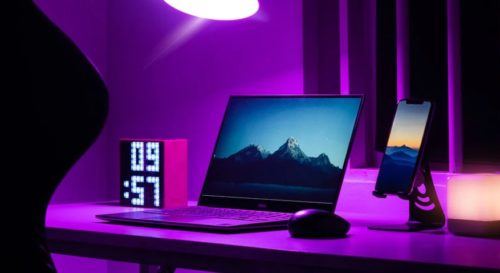When it comes to gaming, enthusiasts and casual players alike are faced with a major decision: Should you invest in a gaming laptop or go for a traditional desktop PC? Both options have their pros and cons, and the choice depends largely on your gaming needs, lifestyle, and budget.
In this article, we’ll compare gaming laptops and gaming desktop PCs across three critical factors: portability, performance, and value.
Difference Between Gaming Laptops and Gaming PCs
1. Portability: Gaming Laptops Shine Here

The most obvious advantage of any gaming laptop is the portability factor. For travel gaming where you can’t take your monitor and full set up with you, a laptop is the only choice. Whether you’re traveling, commuting, or heading to a friend’s house, a gaming laptop allows you to enjoy your favourite games without being tethered to a desk.
Gaming laptops are compact, easy to carry, and all-in-one machines that come with built-in screens, keyboards, and batteries. Many modern gaming laptops are slim enough to fit into a backpack and have battery life that can last for a few hours of gaming (although you may need to lower settings for extended playtime).
On the other hand, gaming PCs are much bulkier and require more space. A desktop gaming rig requires not only a tower but also a monitor, keyboard, and mouse, making it less convenient for portability.
While it’s possible to transport a desktop PC and build a small form factor PC for travel, it’s not something you’d want to do regularly, especially if you have multiple peripherals to pack up.
Winner: Gaming Laptops
2. Performance: Gaming PCs Usually Have the Edge
When it comes to performance, gaming desktop PCs are the undisputed champions when compared like for like price wise. Desktop PCs have more room for powerful components, such as high-end CPUs, GPUs, and cooling systems. The additional room means more space for airflow, lowering the risk of overheating and generally improving thermals.
Desktops can be equipped with top-tier processors like Intel Core i9 or AMD Ryzen 9 and high-performance graphics cards such as the NVIDIA GeForce RTX 5090, which can push games to their highest settings with minimal lag. With desktop PCs, you can upgrade individual components over time, ensuring that your rig stays relevant for years.
Gaming laptops, while capable, are generally more limited in terms of performance. Due to their compact size, laptop components are often throttled to prevent overheating.
High-end gaming laptops feature powerful GPUs, such as the NVIDIA RTX 4080, but even the best gaming laptops cannot match the raw power of their desktop counterparts. Plus, the thermal constraints in laptops limit how much you can push them for long gaming sessions.
Another drawback for gaming laptops is that they are difficult (if not impossible) to upgrade. Most gaming laptops have fixed RAM, GPUs, and storage, which means that if you want to upgrade your hardware down the line, you’ll need to buy a completely new laptop.
Winner: Gaming PCs
3. Value: Gaming Laptops Offer More Flexibility

In terms of value, both gaming laptops and gaming PCs can offer excellent performance, but the overall cost and long-term value differ.
While gaming laptops tend to be more expensive for the same performance level (due to their portability and integrated nature), they offer the unique advantage of convenience.
If you’re someone who values gaming on the go or doesn’t have space for a full desktop setup, then a gaming laptop is worth the premium. Laptops also require fewer accessories, as they come with an in-built screen, keyboard, and trackpad, saving you the cost of purchasing separate peripherals.
As opposed to gaming PCs which usually offer more power for your money. For the same price, a gaming desktop will generally have better specs than a laptop. Plus, desktops can be easily upgraded and repaired (replacement parts are standardised in most gaming PCs but laptops require specific model parts that aren’t always available) over time, which means you don’t have to replace your entire system as technology advances.
While gaming desktops can be a bit of an upfront investment, they tend to offer better long-term value, especially if you enjoy customizing your rig or want to stay on the cutting edge of gaming tech. With PCs your also able to upgrade and change your peripherals, if you want a better mouse & keyboard or a bigger/higher end monitor it’s not a problem.
Winner: Gaming PCs (for long-term value and upgradability)
Conclusion: Which One Is Better for You?
Overall, the choice between a laptop or gaming PC should be based on your individual needs.
- If portability is your top priority, and you’re willing to pay a premium for the convenience of gaming anywhere or need a space saving rig, then a gaming laptop is the right choice for you. They’re perfect for gamers who travel or want to game in multiple locations without the hassle of setting up a full desktop.
- If maximum performance and upgradeability matter more to you, and you have the space for a stationary setup, then a gaming PC is the better option. Desktops offer superior gaming power, better cooling, and more flexibility in upgrading your hardware as time goes on.
In the end, both options have their strengths, and there’s no one-size-fits-all answer. Consider your lifestyle, your gaming habits, and your budget to make an informed decision.
Author Profile
- Blogger by Passion | Contributor to many Tech Blogs in the United Kingdom | Fascinated to Write Blogs in Business & Startup Niches |
Latest entries
 Tech Updates18th September 2025Advancing Audio-Visual Systems for Modern Work, Learning, and Public Spaces
Tech Updates18th September 2025Advancing Audio-Visual Systems for Modern Work, Learning, and Public Spaces Gaming29th May 2025Are Gaming Laptops Better Than Gaming PCs? A Comprehensive Comparison
Gaming29th May 2025Are Gaming Laptops Better Than Gaming PCs? A Comprehensive Comparison Tech Updates8th May 2025Are Smart Locks the Future?
Tech Updates8th May 2025Are Smart Locks the Future? Business6th March 2025Edward Thornton: A Notable Figure in the Investment World
Business6th March 2025Edward Thornton: A Notable Figure in the Investment World

